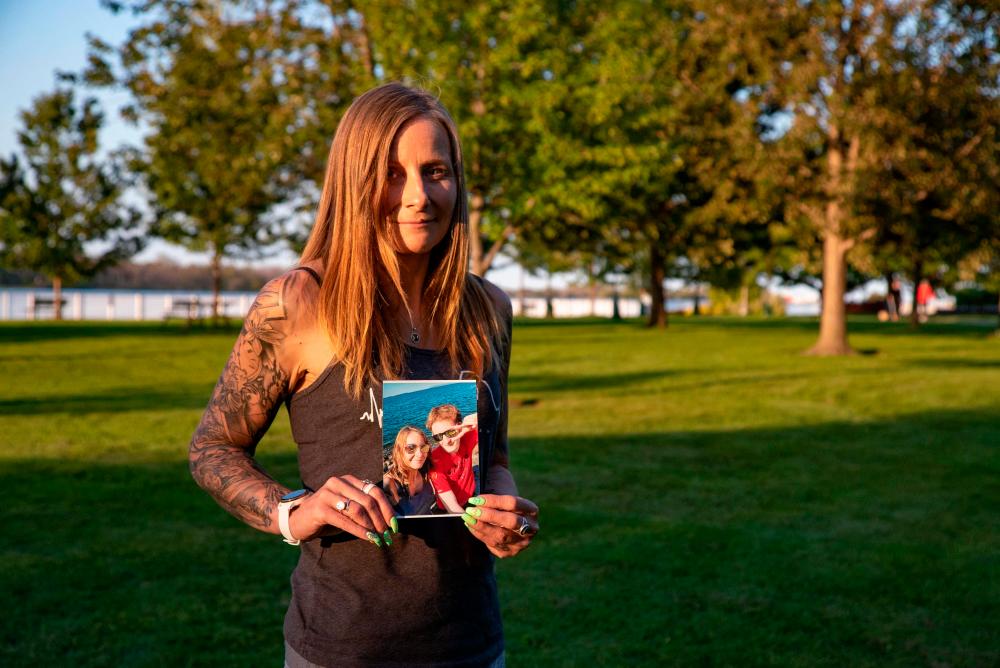WINDSOR: The moment Kim Prosser learned that her 19-year-old son Ashtyn had died by suicide, she says she dropped to the floor, where she lay “shaking and so cold.”
Ashtyn was one of at least 100 people who police say died after a Canadian man sold him a substance over the internet that was used to assist people with suicides.
The seller -- Kenneth Law -- has been accused of sending as many as 1,200 packages across dozens of countries since 2020. Arrested in May, he is facing multiple charges of “counselling or aiding suicide” as a sprawling international investigation unfolds.
Authorities suspect the 58-year-old Law, formerly a cook at a Toronto hotel, of marketing the substance -- which can also be used as a food additive -- to vulnerable people online.
Ashtyn was one of them, Prosser told AFP during an interview at a park facing the Detroit River in Windsor, on the US-Canada border, about an hour away from her home.
“He was super happy, fun-loving, outgoing, but only with, you know, people that he would find passion with,“ she said.
He had expressed suicidal thoughts to her in the past, she said.
Then, in March, she got that final call to tell her “this time he did it. He succeeded, and Ashtyn’s gone.”
Ashtyn was one of 14 victims aged between 16 and 36 in Canada who used kits they purchased from Law to end their lives, according to police.
With more than 160 packages sent in the country, they fear that number will rise.
In Britain, at least 272 people purchased products from Law's websites -- 88 of whom died, police there have said.
Alerted by Interpol, several other countries have launched investigations, including New Zealand, and Italy, where nine buyers have been identified and one victim has died.
Australian authorities are also understood to have launched a search.
France, for its part, has documented around 30 buyers -- but has not opened an investigation as the use of the product does not constitute an offense, a police source with knowledge of the case told AFP.
The same is true of Ireland, which has reported a “small number” of deaths but has not launched a criminal investigation.
Law, who has been in custody since his arrest, intends to plead not guilty, said his lawyer Matthew Gourlay.
“This is certainly the first of its kind prosecution,“ he told AFP, adding that his client was being prosecuted for selling a product that “until recently was available on amazon.com. So we find that to be troubling.”
“I’m selling a legal product, okay,“ Law told the Globe and Mail newspaper shortly before his arrest.
“And what the person does with it? I have no control.”
'A knock on the door'
David Parfett, whose 22-year-old son Tom died of suicide in Britain in 2021, fears that defense may well hold.
Parfett, who lives in Maidenhead, outside of London, describes the moment he learned of Tom’s death as “a knock on the door early morning. And then, of course, your world’s very different after that.”
“He loved football. The one overriding memory of Tom as a kid was he always had a ball at his feet,“ he told AFP from his Victorian home, where the walls are covered in photos of Tom.
“I remember him every day. Losing him is something that kind of almost never leaves you.”
His son, he said, “was struggling, he was depressed.”
In the wake of Tom’s death, Parfett says he came across a forum visited by his son online where other users “were encouraging him to take his own life,“ and using coded messages that sent him to Law’s website.
The father of three fears it is “unlikely” that Law will be prosecuted for his son’s death.
“Kenneth Law was just a businessman... And he seemed to find a way in which he could convince himself that supplying suicide kits was a perfectly legitimate business,“ Parfett said.
Prosser, who is now working to launch an association in her son’s memory to fill gaps in health care for people in distress, says she hopes that Law “can take accountability for the decisions that he made.”
“I do know that Ashtyn wasn’t well, and I know that he had struggles,“ she said. “The hardest thing for us to do is to ask for help.” - AFP









